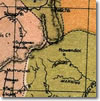
Biographical entry
| Home | Browse | Search | Previous | Next |

|
Unlocking Regional Memory
Biographical entry
|
|
Clarke, William Branwhite (1798 - 1878)Reverend, B.A., M.A. |
|||
|
|||
| Born: 1798 East Bergholt, Suffolk, England. Died: 1878 Sydney, New South Wales. | |||
William Branwhite Clarke, geologist and Anglican clergyman, was born in 1798, at Suffolk, England. In 1817 he entered Jesus College, Cambridge (B.A., 1821; M.A., 1824). His published several papers on meteoric phenomena and geology. His notes on zoology in the Magazine of Natural History in the 1830s attest the scope of his work. Without ecclesiastical or aristocratic connections to aid him, Clarke's chances of church preferment were small, and in 1838, he accepted an appointment to a chaplaincy in New South Wales. He arrived at Sydney with his family in May 1839. Clarke held various posts such as Minister and Headmaster and was prominent though never a leader in the church in Sydney until his retirement in 1871. Clarke left his mark in New South Wales as a geologist rather than as a churchman. Clarke predicted the gold rush of the 1850s in 1841 when he came across gold particles during one of his regular geological surveys proclaming that the colony would be found ‘abundantly rich in gold’. Clarke's work on the Australian goldfields was acknowledged by both the government of New South Wales and the Royal Society of London. Clarke's most important contribution to Australian geology however, was his work on the age of the coal deposits of New South Wales. In 1877 Clarke was awarded the Murchison medal of the Geological Society of London for his work on the coal measures of New South Wales. For almost forty years Clarke was prominent in the colony's scientific life and was held in very high regard unitl his death in 1878. |
| ||
| ||
|
|
| ||
|
Published by The Australian Science and Technology Heritage Centre, 5 April 2004 Prepared by: Acknowledgements Updated: 23 February 2010 http://www.nswera.net.au/biogs/UNW0191b.htm |